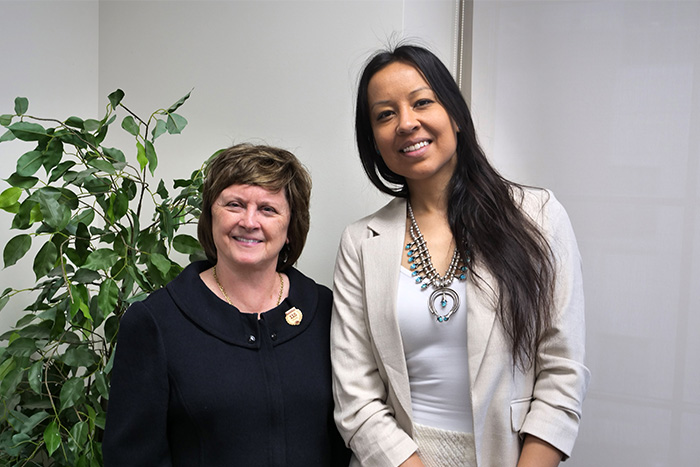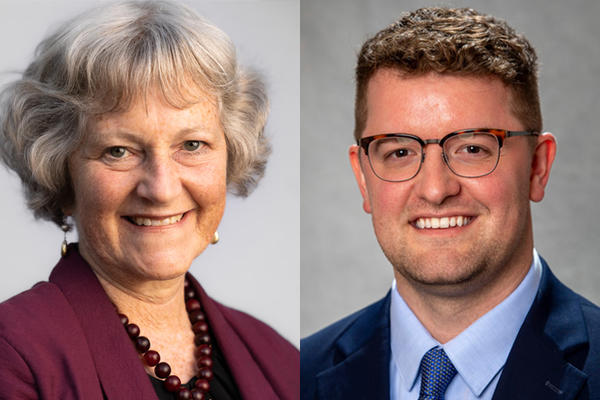Johnston delivers Planetary Health Lectureship on Indigenous food systems
February 19, 2024

Lyla June Johnston, PhD, delivered the 4th annual Planetary Health Lectureship Remembering our Ecological Purpose: Indigenous Food Systems and the Promise of Homo Sapiens, which detailed Indigenous food systems and advocated for a mind shift to better tend the land.
Teddie Potter, PhD, RN, FAAN, FNAP, planetary health director for the School of Nursing, welcomed attendees to the event, which was held Jan. 25 in Coffman Theater. “Some of you may wonder what does soil, air and water have to do with nursing. But nurses deeply understand that humans and the rest of nature are interconnected. We cannot have human health without environmental health, and we cannot have wellbeing without environmental justice,” said Potter. The event kicked off a year of events to celebrate the school’s 115th anniversary.
Karen Diver, MPA, Fond du Lac Band of Lake Superior Chippewa, senior adviser to the president for Native American affairs at the University of Minnesota and former special assistant to President Obama, introduced Johnston, who is an Indigenous musician, scholar and community organizer of Diné (Navajo), Tsétsêhéstâhese (Cheyenne) and European lineages. Johnston blends her study of human ecology at Stanford University, graduate work in Indigenous pedagogy, and the traditional worldview she grew up with to inform her music, perspectives and solutions.
Johnston recently completed her PhD dissertation on the ways in which pre-colonial Indigenous Nations shaped large regions of Turtle Island (aka the Americas) to produce abundant food systems for humans and non-humans, which was the focus of the lecture.
“This lecture is designed to break open our conception of what Indigenous peoples have done on this land, which has been severely distorted to all of us,” said Johnston.
She discussed case studies of Indigenous food systems, including the Shawnee chestnut groves. “This was a manmade food system. That’s part of our heritage as Indigenous peoples and that heritage is erased when we say, ‘look at this wild forest’ or ‘look at this pristine, untouched nature.’ Well, actually a lot of the country was never wilderness to begin with. It was a highly curated garden.”
She says as Homo sapiens, we have a role in ecology. “We’re meant to be the guardians, the stewards, the caretakers, the gardeners of the land,” said Johnston. “We have to tend the garden of our mind and of our heart to properly tend the garden of our Earth.”
She closed her lecture by singing All Nations Rise.
Cosponsors of the event included the Center for Planetary Health and Environmental Justice at the School of Nursing, Center for Indigenous People, Health and Nursing of North America at the School of Nursing, University of Minnesota Climate Adaptation Partnership, Circle of Indigenous Nations, University of Minnesota Twin Cities Office of Sustainability and Center of American Indian and Minority Health – Duluth.


